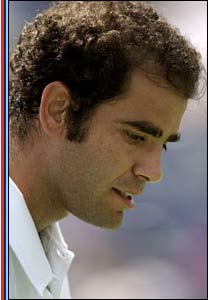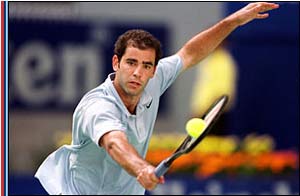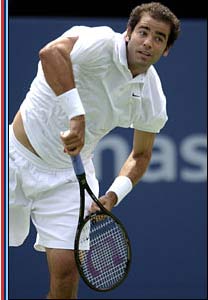<% ns_puts [mkm_getnavbar] %>
Motivation Makes it Happen
Why it's Getting Harder and Harder for Sampras and What can be Done
Speculation has been rampant about Pete Sampras' ability to win another big one. He hasn't won a tournament since Wimbledon 2000. John McEnroe states that Pete's self-confidence is way down, giving his opponents a window of opportunity previously not there. Sampras supposedly no longer has that automatic edge when he steps on the court. Indeed his level of confidence is down as attested to by my data on Sampras going back to 1991. Since 1991, I have complied psychological information on most ATP and WTA players. This data covers 10 categories important to tennis performance.
|
My Psycho-world rankings are an objective measure of psychological performance based on an extensive qualitative observation system and a few quantitative measures (more on this at the end of the year). Players' mental discipline, determination, learning ability, tennis intelligence, emotions, self-confidence, concentration, motor skills, motivation, and a conglomeration of personality traits are evaluated to arrive at a measure that reflects their psychological state and skills. And yes, Sampras' confidence and especially motivation are way off compared to previous years.
Sampras has always been in the top-10 of my Psycho-rankings, but never has he reached the top-3. His best psychological performance was in 1995 when he finished 4 in the rankings. People have questioned why a player like Sampras was never number 1 on my Psycho-rankings. The answer is, Sampras' psychological make-up has always been driven by his tremendous technical skills and motor talent. In other words, his mental toughness has always been influenced by the flow of his game or the course of a match. His game is what makes him mentally tough and not the other way around as with players like Change or Muster.
If anything, Sampras' mental toughness has been questionable on
numerous occasions, especially during phases in his career when he
frequently experienced psychosomatic complaints during matches. Remember
his bouts with stomach cramps and nausea? In these matches his visceral
"guts" literally affected his psychological guts" and vice
versa. During those times he looked anything but mentally tough. 
Essentially, Sampras has always had a big game, one that shined on grass, a surface on which he established himself as a legend. Sampras played the grass court patterns to perfection. How could he not be confident knowing that he could boom in serve after serve, put away the easy volley and then get at least one break per set? Rarely was he ever contested to the max.
Sure he has won tough matches, and yes, his ability to concentrate has always been stellar, but when we talk about Sampras' mental game we must hold him to a higher standard. That is the essence of my Psycho-rankings. Players are not compared with others, rather they are compared to themselves and their best psychological performances on an annual basis. From this perspective, as McEnroe said, Sampras is only 1/10 the player he once was psychologically.
|
McEnroe actually used this estimate in the context of Pete's self-confidence, going on to say, even at that level he still is way above the masses of other players. I believe we can extrapolate this figure to other areas of Sampras' tennis psyche like motivation and determination. The bottom line is, Sampras is not the player he once was. That is obvious.
Here is my explanation
As a player who depends on big weapons to intimidate and beat opponents into the ground Sampras has come to notice that many players, especially the young guns like Roddick and Fedderer have developed games that are even bigger than his.
Except on grass and very fast carpet or hard courts, Sampras is beatable day in and day out (even on fast surfaces for that matter). Awareness of his own vulnerability, even if only subconsciously, is enough to affect his game at the wrong time and cause him to lose many of those big-points he once won.
Subliminal pressures can play havoc with a player's reaction time and motor skills. To counter the trend he is experiencing, Sampras will need to summon all the mental fortitude he can muster to regain the same level of motivation he had in years past. He has to get hungry again and make the adjustments he needs to stay above the pack. Fortunately, with his weapons, his task will be easier than Chang's, who I wrote about a couple of days ago.
Essentially, Sampras must again put in the court time needed to get back his edge. Agassi has done this numerous times during his roller-coster like career. It's not a physical issue, it's a psychological one. At this juncture in Sampras' career he must call on the psyche that made him to reshape his physical and technical game; and that starts with getting highly motivated again.
|
The downside is that despite all the rhetoric and self-proclamations that he is still on top of things, and that it's just a matter of time, or a break here and there (a la Chang) before he wins another big one, it's not getting any easier. Remember, what you see or hear is not necessarily what you get. You cannot fool your body with idle phrases and illusory thoughts. Sincerity is the key. You must REALLY want what you seek. And how does one know that they are not lying to themselves about their motives? How does one determine if one's desires are congruent with one's psychophysiology? You measure it (see Mind Your Heart).
If there is incongruence between verbal report (what a player says) and actual psychophysiology (e.g., saying you are motivated before a match, but in reality your psychophysiology is in a pre-sleep mode), then you try to manipulate it.
I doubt that Sampras or his coach would ever go to such lengths. For one thing, getting pumped and winning easy has been second nature for Sampras for so long, he would never look to sport psychology for a solution. That is a shame. But unfortunately, it's an attitude that is all to prevalent in tennis and many sports, especially among fading superstars.
For older players like Sampras, psychophysiological monitoring and biofeedback could do much recharge the batteries and facilitate the optimum performance they once took for granted. Instead of waiting for that moment of inspiration or motivation to occur spontaneously, Sampras could seize control of his psyche and manipulate it to find the strength and desire to once again put in those long hours of training. He could do this in an efficient manner and perhaps find his former or improve his current game to better fend off the young guns and claim a few more slams.
Let's see what happens to Pete here at the Open this year. Will the above be moot for now, or a plausible analysis offering a potentially potent solution to his visibly eroding game?
Your comments are welcome. Let us know what you about think this article by emailing us here at TennisONE.
Dr. Roland A. Carlstedt has followed the professional
tennis tours since 1985, fulltime from 1989-1998 in which he on average
attended 25 tournaments a year including all Grand Slam events and
important Davis Cup ties. During this time he complied perhaps the most
extensive database in existence on the psychological performance,
tendencies, and profiles of most ATP and WTA players. His annual
Psychological World Rankings for Tennis have been published since 1991
more than 500 times in over 40 countries. His rankings and data are based
on his Psychological Observation System for Tennis. Interestingly his 2000
rankings which were released prior to the 2001 Australian Open had 2 of 4
semifinalists and 8 of 16 quarterfinalists on them including such unlikely
players as Arnaud Clement and Sebastian Grossjean. His 2001 rankings will
appear in TennisONE at the end of the year.
Last Updated 8/29/01. To contact us, please email to: webmaster@tennisone.com
TennisONE is a registered trademark of TennisONE and SportsWeb ONE; Copyright 1995. All rights reserved.



